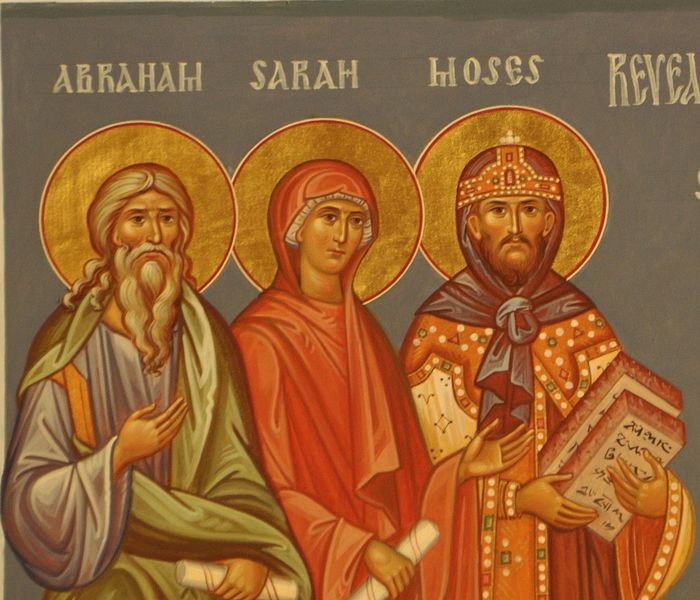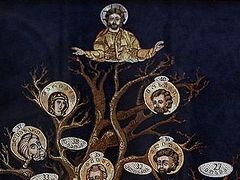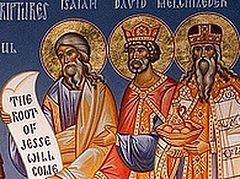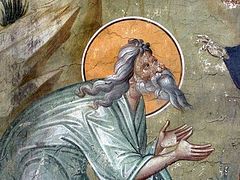Christ is born!
On the Sunday before Christmas, we encounter in the Scripture readings of the Orthodox Church a cast of literally hundreds of women and men who were faithful to God’s promises as recorded in the history of the Old Testament.
We read the genealogy of Christ in Matthew’s Gospel (Matthew 1:1-25) about some of those people of the Old Testament who were part of God’s preparation for the incarnation. Entire generations of people preparing the way for the Lord. led by a few very faithful men and women. In the Epistle from Hebrews (Hebrews 11:9-10, 17-23, 32-40) we hear a few more details from the lives of some of those same people who were faithful to God no matter that they suffered for the faithfulness and no matter that they didn’t receive the fulfillment of what God promised. They remained faithful to God’s promise and trusted that God would fulfill what had been prophesied or promised.
All these women and men heard about the promise of the coming of the Messiah but none of them lived to see it, yet they remained faithful to God. St. Gregory Palamas describes them as refining humanity, slowly moving us from the original rebellion of Eve and Adam to the time of Blessed Virgin in whom God would become incarnate. Besides all these examples of people who followed God in faith, if we studied the lives of all these people we would find examples of both people who remembered God in times of trouble, and those who forgot God even in good times.
Really for us to prepare for Christmas we should be reading the scriptures year round to know what God promised, what people suffered for these promises and as a result of them. We would learn about our spiritual ancestors in the faith who struggled for several thousand years before the coming of Jesus and since the time of his death. We would learn how hard a struggle it was for the people to be faithful, and how long the sojourn.
Matthew’s genealogy and the Epistle from Hebrews include people who are farmers and shepherds, business people and slaves, carpenters and soldiers, generals and kings, wise and foolish, musicians and poets, rich and poor, apostles and apostates, faithful and faithless, adulterers and prostitutes, sinners and saints, murderers and law abiding citizens.
And when we study God’s promises and what God did through the centuries we understand the faithfulness of our God and God’s patience in working with us His creatures for countless cnturies. For our history is not one of continual improvement in morals and faith, but rather a jagged history of ups and downs and falling away and turning back and repenting.
And then the surprise of Christmas.
God became like us in the incarnation – God became one of us, taking on human form. At Christmas we remember God becoming one of us, becoming human. God became human to lift us up out of our own sinfulness and to transfigure and transform our humanity to become like God, to become God’s children. God became human so that we humans could again become like God. God wants nothing to separate us from Him.
If we remember all these people and their successes and failures we can learn from them about how we are to behave. We can learn both from their examples of faithfulness and the examples of faithlessness.
We might remember the old saying: Forget your mistakes, remember their lessons.
Faith, is not “blind” but rather is conviction based on revelation, promise of God and past experience. Faith is based on a knowledge of God fulfilling His promises in Scripture, and looking to the future where more of God’s promises will be fulfilled. The lives of the saints, or our spiritual ancestors helps us to understand God and our role in our salvation.
God does not ask us to leap off tall buildings nor to turn bread into stones. God asks us to know Him through the study of His scriptures and through the lives of the saints and people of God. God wants us to know Him in and through our daily lives – in prayer, the sacraments, through charitable giving, through fasting, forgiveness and repentance. None of what God asks from us is impossible for us or beyond our reach.
God does not call us to do absurd things (just to make a funny video or to make a name for ourselves), or to go against sound judgment, though God may expect us to do very difficult things. Mostly, God calls us to open our hearts to know Him, to test and see if what God said is true in the lives of the saints and in the scriptures. God asks only that we continue to trust in Him and to trust the witness of our spiritual ancestors, the women and men and children who are saints in the faith. Christmas indeed is a family affair, but the family turns out to include all those who have ever believed God and who prepared the way for us to believe as well. And we call to mind that family at Christmas.
As the Epistle concluded about these saints, our faithful ancestors:
And all these, having obtained a good testimony through faith, did not receive the promise, God having provided something better for us, that they should not be made perfect apart from us.
All of those believing saints have been waiting through the centuries for us to believe as well, and to follow Christ. They await Christ being born in our hearts, our lives and our homes so that they can join us in the Kingdom of Heaven.
Glorify Him!




